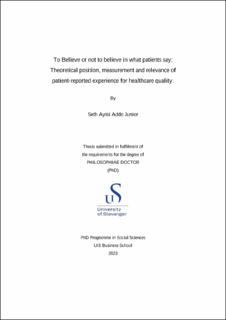| dc.contributor.advisor | Olsen, Espen | |
| dc.contributor.advisor | Mykletun, Reidar J. | |
| dc.contributor.author | Addo Junior, Seth Ayisi | |
| dc.contributor.editor | Mykletun, Reidar J. | |
| dc.date.accessioned | 2024-01-29T09:57:00Z | |
| dc.date.available | 2024-01-29T09:57:00Z | |
| dc.date.issued | 2024 | |
| dc.identifier.citation | To Believe or not to believe in what patients say: Theoretical position, measurement and relevance of patient-reported experience for healthcare quality by Seth Ayisi Addo Junior, Stavanger : University of Stavanger, 2024 (PhD thesis UiS, no. 741) | en_US |
| dc.identifier.isbn | 978-82-8439-213-4 | |
| dc.identifier.issn | 1890-1387 | |
| dc.identifier.uri | https://hdl.handle.net/11250/3114245 | |
| dc.description.abstract | The concept of patient experience has gained traction in the past few decades regarding its relationships with patient outcomes and as an indicator of healthcare quality. Patient experience has been deemed a pillar of healthcare quality, alongside safety and clinical effectiveness. Despite this growth in research, some researchers have raised concerns over the subjectivity of the concept as well as the knowledge and skills possessed by patients to accurately assess and report on the hospital environment and healthcare process.
The overall objective of this thesis, therefore, was to ascertain the relevance of patient experience by presenting it as a valid reflection of hospitals’ quality care climates through the perspectives of patients. The main research question was: To what extent is patient-reported experience relevant for healthcare quality? To answer this question, the thesis pursued three main objectives: to assess the positioning of patient experience within the healthcare quality literature, to assess the psychometric properties of a patient-reported experience measure, and to assess the longitudinal relationship between patient experience and a clinical outcome in Norway.
The findings of this thesis showed a solid theoretical positioning of patient experience alongside patient outcomes and organisational climate factors in hospitals. It was seen that associations among the three concepts were largely conclusive, and mostly positive. Secondly, it was found during the psychometric assessment that, subject to some improvements, the concept and its measurement possessed reliability and validity for reporting on hospital factors and the healthcare process from the patients’ perspective. Lastly, it was found that patient experience related significantly with hospital-associated infections (a clinical outcome) over time. This ascertained the importance of patient experience for outcomes that were not directly reported by patients.
This thesis contributes significantly to the epistemology of patient experience and its relevance for healthcare quality. The results show the state and direction of the literature on patient experience, the importance of measurement rigor for patient experience, as well as the implications of patient experience for the other pillars of healthcare quality (safety and clinical effectiveness). As the health industry is a complex one with constantly evolving factors (e.g., illnesses, pandemics, demographics), it is imperative to understand that the viewpoint of patients represents a very crucial lens through which healthcare providers can continuously assess the climate of their hospitals and improve their performance.
This thesis presents recommendations relevant for practice and policy, based on the findings. Among other recommendations, hospital management and boards should pursue patient experience improvement strictly and systematically by continuously giving adequate support for both short-term and long-term intervention programmes. Policymakers should also insist on hospitals’ and healthcare providers’ usage of results from national surveys in their improvement programmes. This thesis also gives some directions to future studies for advancing the epistemology of patient experience. | en_US |
| dc.language.iso | eng | en_US |
| dc.publisher | University of Stavanger, Norway | en_US |
| dc.relation.ispartofseries | PhD thesis UiS; | |
| dc.relation.ispartofseries | ;741 | |
| dc.relation.haspart | Paper 1: Addo Jr., S.A., Mykletun, R.J. & Olsen, E. Towards a quality care climate perspective: a review of associations among patient experiences, patient outcomes and organisational climate in hospitals. [In review, not included in the repository] | en_US |
| dc.relation.haspart | Paper 2: Addo, S.A.; Mykletun, R.J.; Olsen, E. (2021) Validation and Adjustment of the Patient Experience Questionnaire (PEQ): A Regional Hospital Study in Norway. International Journal of Environmental Research and Public Health 18(13): 7141. https://doi.org/10.3390/ijerph18137141 | en_US |
| dc.relation.haspart | Paper 3: Addo, S.A. Can we trust what patients say? A latent growth curve on the associations between patient experience and hospitalassociated infections in Norway over time. [In review, not included in the repository]. | en_US |
| dc.rights | Navngivelse 4.0 Internasjonal | * |
| dc.rights.uri | http://creativecommons.org/licenses/by/4.0/deed.no | * |
| dc.subject | økonomi | en_US |
| dc.subject | pasienterfaringer | en_US |
| dc.subject | helseforetak | en_US |
| dc.title | To Believe or not to believe in what patients say: Theoretical position, measurement and relevance of patient-reported experience for healthcare quality | en_US |
| dc.type | Doctoral thesis | en_US |
| dc.rights.holder | © 2023 Seth Ayisi Addo Junior | en_US |
| dc.subject.nsi | VDP::Social science: 200::Economics: 210::Business: 213 | en_US |

